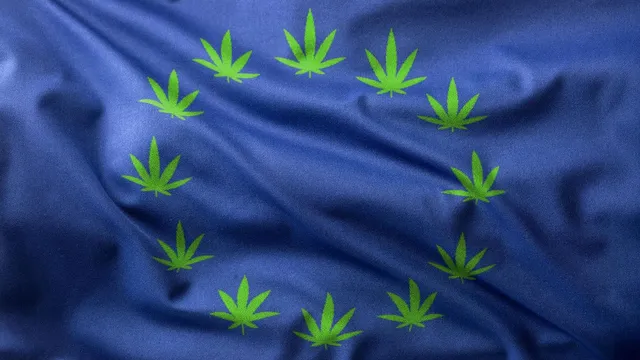
Germany set to lead Europe's cannabis market with billion-dollar sales
2025-05-25 00:00- Europe is home to 25 countries that have legalized or decriminalized cannabis, with the market potential estimated at $50 billion annually.
- Germany leads Europe with about $500 million in cannabis sales, projected to reach nearly $1 billion by 2025.
- Investment from U.S. companies is substantial, but analysts caution against potential oversupply and unsustainable growth.
Express your sentiment!
Insights
In the evolving landscape of cannabis legalization and market growth, Europe is attracting attention as a promising frontier for marijuana companies. As of May 2025, approximately 25 European countries have embraced some level of cannabis legality or decriminalization, driving expectations of this market reaching $50 billion in annual sales if regulatory reforms spread throughout the region. Kwon, co-founder of a cannabis company, emphasizes the significance of entering the European market, predicting that it could account for up to 20% of their sales. This perspective underscores the shifting focus towards Europe, viewed as a critical battleground for establishing cannabis viability that extends globally. Germany stands as a focal point within the European cannabis sector, recording around $500 million in sales last year, contributing significantly to the overall potential of the market. Analysts anticipate that Germany could nearly double this figure by 2025. Additionally, the UK has ventured into medical cannabis with reported sales of about $255 million annually, demonstrating another layer of growth opportunity in Europe’s cannabis landscape. While U.S. cannabis sales maintain a higher volume, projections indicate the European market could eclipse it as favorable conditions align. Despite the enthusiasm surrounding the European market, caution exists among some financial analysts. Kristoffer Inton from Morningstar has expressed concerns regarding the sustainability of the current level of interest from U.S. and Canadian companies within this market. He suggests that oversupply, similar to challenges faced by Canadian operators, could lead to price drops and financial struggles in Europe as well. This highlights an ongoing risk as foreign investments pour significant amounts into the continent, setting the stage for a competitive environment. Investment highlights include Curaleaf’s significant revenues, which show a progressive increase in their international division. Their recent earnings call revealed that Curaleaf generated $1.2 billion in U.S. sales but is experiencing a shift towards international growth, with Europe emerging as the fastest-growing sector. Meanwhile, London-based Artemis Growth Partners, managing nearly $400 million in assets, has committed to investing more in European cannabis companies amidst their perceived success. While the excitement of potential growth abounds, the challenges of maintaining a balanced and profitable market trajectory remain a pivotal point of discussion.
Contexts
The current cannabis legalization status in Europe is a complex and evolving landscape that varies significantly by country. As of May 25, 2025, several nations within the European Union and beyond have made notable strides towards cannabis reform, while others maintain stricter prohibitions. In recent years, the trend towards legalization has gained momentum, influenced by shifting public perceptions, increased advocacy for personal freedoms, and recognition of potential medical benefits associated with cannabis use. Austria, for instance, has initiated discussions for a regulated cannabis market, aiming to align with public opinion that favors legalization and a controlled distribution framework. This reflects a broader pattern where many EU member states are actively exploring legislative frameworks that would allow for the decriminalization, medical use, or recreational use of cannabis. Countries such as Malta and Luxembourg have taken significant steps by legalizing recreational cannabis, making them leaders in this movement within Europe. Malta became the first EU country to legalize recreational marijuana in December 2021, allowing adults to possess up to seven grams and cultivate up to four plants for personal use. Luxembourg has also enacted laws allowing adults to possess and cultivate cannabis, but with future plans to implement a regulated market for sales still under discussion. These initiatives mark a pivotal shift, where legislation is increasingly influenced by evidence-based arguments highlighting health benefits and economic opportunities stemming from a regulated cannabis market. On the other hand, countries such as Poland and Italy appear more cautious, focusing primarily on medical cannabis. Poland, having legalized medical cannabis in 2017, has seen growing acceptance of cannabis for specific health conditions. However, the pace of change regarding recreational legalization remains slow. Italy allows medical cannabis but has seen recent debates around decriminalization efforts for recreational use rising again in parliament. Such varied legislative landscapes illustrate the differing cultural, social, and political contexts that inform each country's approach to cannabis. Overall, while progress is being made, the future of cannabis legalization across Europe remains uncertain and fragmented. It calls for careful observation of evolving legislation, public health strategies, and economic impacts. Stakeholders ranging from governments to health advocates and private sector players must continue engaging in constructive dialogue to shape a regulatory environment that balances public safety, personal freedom, and economic potential. Consequently, the trend suggests a gradual but defined shift towards more liberal cannabis policies in various segments of Europe, highlighting the importance of considering regional differences and public sentiment in shaping future legislative actions.